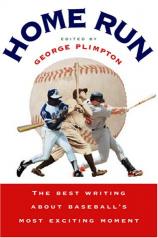Home Run
Review
Home Run
The home run is the most dramatic way to send fans into fits of
ecstasy or agony. With one swing of the bat, a hero is born, either
for the moment or for posterity.
Homer heaven can come on a single swing under spectacular
circumstances, such as Bobby Thomson's "shot heard 'round the
world" against the Brooklyn Dodgers in 1951; a season-long drive,
like Mark McGwire's ascendancy to the single season home run crown;
or a lifetime of achievement, such as joining the elite 500-home
run club.
Since the dinger, the tater, the bomb, and all the other euphemisms
for a home run are so exciting, it follows that some of the most
compelling baseball writing concentrates on the four-bagger. George
Plimpton has amassed such a collection from some of the most famous
scribes --- and not just sports writers --- in the simply titled
HOME RUN.
Among the non-sports literati are Bernard Malamud, John Updike,
Garrison Keillor, and Don DeLillo. The sportswriter team counts Red
Smith, Roger Angell, and Grantland Rice among its roster.
In that Babe Ruth set the standard for parking the pill on the
other side of the fence, it is only right that His Majesty leads
the way. Keillor, Rice, Paul Gallico, and Robert Creamer (giving us
more detail about the slugger's personal life and habits than we
probably need to know) all herald various aspects of the Sultan of
Swat.
Malamud wrote the improbable story of Roy Hobbs, an out-of-nowhere
sensation with a checkered past, in THE NATURAL. Taking a page from
Ruthian lore, Hobbs must hit a homer in order to help a critically
sick kid recover. Keilor fantasizes about the retired yet still
awe-inspiring Ruth making a stopover in his small town. DeLillo,
author of the acclaimed UNDERWORLD, mixes fact and fancy as he
remembers the aforementioned Thomson blast in "Pafko at the Wall."
Updike's nonfiction contribution is the oft-reprinted "Hub Fans Bid
Kid Adieu," a storybook ending to Ted Williams's career.
From the sportswriters, we get Red Smith's take on Thomson's
heroism in "Miracle of Coogan's Bluff" and on the three consecutive
World Series home runs off the bat of Reggie Jackson. Roger Angell,
senior sports editor for The New Yorker, covers the tactile
and mental experience of hitting one out of the park in "Homeric
Tales." And just so you know it's not always of question of what
you do but how you do it, Rick Reilly, a columnist for Sports
Illustrated, offers a condensed history of running the bases in
style.
Other items in HOME RUN include Plimpton's description of the key
figures in Hank Aaron's coronation as the all-time home run king;
Robert Peterson on Josh Gibson, the "Babe Ruth of the Negro
Leagues;" Sadaharu Oh's on life as the "Japanese Babe Ruth;" Rick
Telander on the demons that plagued Roger Maris in 1961, as he
approached Ruth's long-standing single-season of 60 home runs;
Gregory Corso's poetic tribute to Ted Williams; and Daniel
Paisner's story of the fan who caught Mark McGwire's 70th home run
in 1998.
HOME RUN delivers on its namesake: This is a marvelous array of
compositions from different angles --- humorous, serious and
delirious --- on how losing a ball can make so many so happy.
Reviewed by Ron Kaplan (ronk23@aol.com) on January 22, 2011
Home Run
- Publication Date: June 1, 2001
- Genres: Nonfiction
- Paperback: 278 pages
- Publisher: Mariner Books
- ISBN-10: 0156011549
- ISBN-13: 9780156011549



